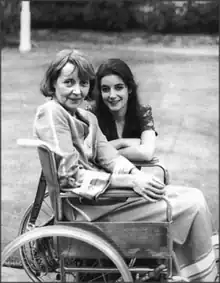Ellen Griffin Dunne | |
|---|---|
 Ellen Griffin Dunne (left) with her daughter Dominique Dunne | |
| Born | Ellen Beatriz Griffin January 28, 1932 Tucson, Arizona, U.S. |
| Died | January 9, 1997 (aged 64) Nogales, Arizona, U.S. |
| Other names | Lenny Dunne |
| Occupation | Activist |
| Spouse | |
| Children | 5, including Griffin and Dominique Dunne |
| Relatives | Hannah Dunne (granddaughter) |
Ellen Beatriz Griffin Dunne (January 28, 1932 – January 9, 1997) was an American activist. After the death of her daughter, Dominique Dunne, Dunne founded Justice for Homicide Victims. In 1989, she was recognized for her advocacy work by President George H. W. Bush.
Early life and marriage
Griffin was born on January 28, 1932, on Yerba Buena Ranch outside of Tucson, Arizona. Her parents were Thomas Francis Griffin and Beatriz Sandoval Griffin.[1] Thomas Francis Griffin was a wealthy Irish American industrialist part owner and executive of Griffin Wheel Company of Chicago, Illinois.[2] Her mother Beatriz Sandoval was Mexican from Nogales, Sonora. She attended Miss Porter's School in Farmington, Connecticut, Briarcliff College, and the University of Arizona, the latter where she studied drama.[1][3]
Griffin met Dominick Dunne in Hartford, Connecticut. They were married in 1954 at Griffin's family ranch in Arizona and lived in New York City before relocating to Beverly Hills. Of their five children, two died in infancy. Among their children were Dominique Dunne and Griffin Dunne.[4] The couple divorced in 1965.[2]
Death of Dominique Dunne and founding of Justice for Homicide Victims
The couple's daughter, actor Dominique Dunne, was murdered by ex-boyfriend John Sweeney at her home in October 1982. He strangled her and attempted to kill himself. Actor David Packer, with whom Dunne was rehearsing for the miniseries V, found Sweeney trying to resuscitate Dunne, before attempting to kill himself by overdosing on pills. Sweeney was arrested and Dunne was transported to Cedars-Sinai Medical Center. She was placed on life support immediately and never recovered. She was removed from life support by her parents on November 4, 1982.[5]
On September 21, 1983, Sweeney was acquitted of second-degree murder, but he was convicted of voluntary manslaughter.[6][7] Dunne's family protested the verdict as an "injustice."[5]
One year later, Dunne and Marcella Leach founded California Center for Family Survivors of Homicide, a victim's rights group.[8][9] Now known as Justice for Homicide Victims, the organization supports victims of homicide with legal support and navigation, counseling and referrals, and financial assistance.[8]
In 1989, Dunne was awarded the Crime Victims Award by Dick Thornburgh. Her work was also recognized by then-President George H. W. Bush at the White House.[3]
Later life
Ellen Dunne had multiple sclerosis starting in the early 1980s.[10] In 1990, she left Beverly Hills and relocated to Nogales, where she built a 5,500-square-foot home on the site of her parents' former ranch.[1][2] She died on January 9, 1997, shortly before her 65th birthday.
References
Footnotes
- 1 2 3 "Paid Notice: Deaths Dunne, Ellen Griffin". New York Times. January 13, 1997. Retrieved 16 October 2018.
- 1 2 3 Quinn, Dale (January 22, 2010). "Ariz. home with Hollywood ties". Arizona Daily Star. Retrieved 16 October 2018.
- 1 2 Foeller, Alice. "Obituary – Tucson Citizen Morgue, Part 2 (1993–2009)". Tucson Citizen. Retrieved 16 October 2018.
- ↑ Dunne, Dominick. "Dominick Dunne on His Daughter's Murder". Vanity Fair. Retrieved 16 October 2018.
- 1 2 Darrach, Brad. "An American Tragedy That Brought Death to Actress Dominique Dunne Now Brings Outrage to Her Family". People. Retrieved 16 October 2018.
- ↑ (Dunne 2009, p. 37)
- ↑ De Atley, Richard (September 22, 1983). "Family of slain actress outraged at trial outcome". The Free Lance-Star. p. 31. Retrieved January 21, 2013.
- 1 2 Day, Brian (6 April 2014). "Organization reflects on three decades of helping families of homicide victims". San Gabriel Valley Tribune. Retrieved 16 October 2018.
- ↑ Arnold, Roxane (3 December 1986). "Strangled Actress : Did Slayer's Penalty Fit His Crime?". Los Angeles Times. Retrieved 16 October 2018.
- ↑ Gray, Kevin (August 28, 1995). "A Kind of Deliverance". People. Retrieved 16 October 2018.
Sources
- Dunne, Dominick (2009). Justice: Crimes, Trials, and Punishments. Crown Publishing Group. ISBN 978-0-307-55722-3.